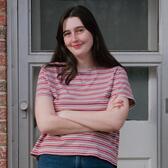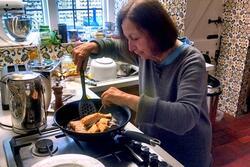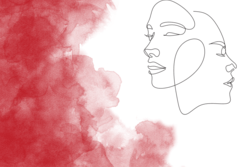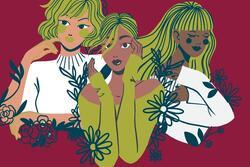7 Questions For Laura Limonic
JWA chats with Latina sociologist and author Laura Limonic.
JWA: Your book, Kugel and Frijoles: Latino Jews in the United States, was published in 2019. I’d love to hear more about your writing process, and anything that surprised you as you created the book.
Laura Limonic: The book came out of my doctoral dissertation. It drew on my own experiences of being Latina and Jewish and trying to understand these larger ethnic and religious categories in the context of migration studies. When I graduated, I received a Berman Fellowship to continue the research and expand it to Miami and California. For my dissertation, I only interviewed people in the Northeast (I was a graduate student and a new mom, so I needed to keep the research close to home). The most interesting part of my research—and the book, I think—came when I started seeing new patterns of ethnic and religious identity building in the different areas of settlement. In other words, a Latino Jew in Miami has a very different personal and communal experience than one in New York. It seems simple, but this really tells us so much about how place influences identity and community in ways we don’t normally think about.
JWA: What makes you proud to be both Jewish and Latina?
LL: It’s a perfect match! I would not be one without the other.
Food, Shabbat, family, and celebrations. I put food first because Jews and Latinos have an important connection to food—not just as nourishment, but as pathways to history, as ties to communities and as a way to show love.
JWA: What drew you to studying sociology, and what did you research for your doctorate?
LL: I was interested in immigration studies and wanted to understand the different factors that help or hinder new immigrants. I’m an immigrant, and my sociology career started in elementary school—because as an immigrant, one becomes an astute student of culture, class, and status. My doctoral studies grew out of this early interest in understanding groups, social ascension, and “fitting in.”
JWA: You’re currently conducting a study on the effects of the pandemic on motherhood. What do you hope to discover with the study?
LL: I’m trying to understand the ways in which the current economic structures fail to provide support for mothers to allow for equity in the workplace and the home. I think it’s so timely that Claudia Goldin just won the Nobel Prize for her work on women and the gender pay gap, which is stubbornly persistent. Even as we see the college graduation rate for women surpass that of men, women continue to make less money in the workplace and take on more of the household labor.
JWA: What inspires your research questions?
LL: The world around me. The motherhood study came about during the pandemic, when so many mothers were expressing their deep discontent—dare I say, rage—but few felt at liberty to express it. I’m working on another project looking at the rising popularity of Chabad [an Orthodox Hasidic sect] in Latin America, particularly among young people with strong ties to non-observant Jewish communities. I looked around and saw thousands of young people at Chabad dinners, parties, and services, and I began to ask questions, which led to this new research.
JWA: What is your favorite thing about teaching sociology?
LL: I love that “aha” moment. I teach a class on Marx, which can be a bit dry for students. But midway through, a light turns and the students begin to see their own social world through a new lens. This is the most gratifying part of teaching (Marxist indoctrination aside).
JWA: What advice do you have for folks who struggle to honor multiple facets of their identity?
LL: We cannot be all things all the time, but we carry all of the different parts of ourselves inside us. Sometimes one part of our identity shines brighter, and other times we rely on other facets of our identity to make sense of our relationships, our world and our environment. The beauty of having multiple facets of our identity is that we have many ways to put ourselves in other people’s shoes.







